This article is written by Niharika Agrawal, from IFIM Law School. This article deals with the concept of suo moto contempt in the light of recent judgment by the Supreme Court in the case of Prashant Bhushan.
Table of Contents
Introduction
Contempt of court is any conduct that tends to disrespect or disregard the authority and the administration of law. The concept of contempt of court is regulated under the Contempt of Court Act, 1971, and Article 129 and Article 215 of the Constitution give power to both the superior courts, that is Supreme court and High Court, to initiate and punish for the same. However, these regulations, especially the Act of 1971, are surrounded by controversies. These controversies were emphasized in the recent judgment in the case of In Re Prashant Bhushan (2020). This article comprises the concept of intra-court appeal or right to one appeal and the requirement of due process in the light of the above case.
Analysis of the Prashant Bhushan case
In this above case, Adv. Prashant Bhushan, one of the activist lawyers of the Supreme Court was convicted of contempt of court for his two tweets in July 2020. According to the Court, the statements in the tweets have created disruption to the administration of justice and might remove the confidence and belief of the public at large from the judicial system, especially the Apex Court and the Chief Justice of India (CJI).
The first tweet was against the Supreme Court along with the past four CJIs and their role in destroying Indian Democracy in the last six years without even a formal emergency. Another tweet was remarked against the former CJI S A Bobde criticizing him for riding a motorbike of Rs. 50 lacs belonging to the ruling party BJP leader at his home town Nagpur, without helmet and mask, during a pandemic when the Supreme Court is under lockdown mode and the citizens are restricted to the fundamental right to access justice. Based on the above tweet, three judges of the Supreme Court have issued a notice for contempt of court and initiated suo moto criminal contempt of court proceedings against Prashant Bhushan.
The Supreme Court of India consisting of three Bench judges, in this case, held that the two tweets were related to distorted facts, and hence Prashant Bhushan was guilty of criminal contempt and was fined Rs.1. It was also contended that if the contemptor fails to pay the fine, he will be imprisoned for 3 months and would be barred from practicing for 3 years. There were many criticisms against the judgment given by the three Bench judges in the Apex Court.
Criticism against the judgment
- Nearly 1500 lawyers from the entire country including senior members of the Bar Council of India expressed their disagreement over the conviction by the Supreme Court and urged the Apex Court to take the corrective steps to prevent miscarriage of justice. The lawyers in their statement pointed out the bar that silence under the threat of contempt might undermine the independence and ultimately the strength of the Supreme Court. Such judgments cannot restore the authority of the courts in the eyes of the public. It may however deter the lawyers from being outspoken. The lawyers also stated that an independent judiciary system does not exempt the judges from scrutiny and comment. As a lawyer’s duty, they are free to bring any shortcomings to the notice of the bar, bench, and the public at large. Justice must be allowed to suffer the scrutiny and respect, even though outspoken comments of ordinary men.
- A group of 88 academics and civil society criticized the verdict of the Supreme court and stated that the lawyers affirm their right to criticize and express their disagreement with the actions or inactions of the Supreme Court whenever necessary.
- The Mazdoor Kisan Shakti Sanghathan also criticized the verdict. They considered the judgment as a “ blot on the history of independent, democratic and free India.” According to them, the tweets were legitimate expressions of the critique of the court and the CJIs.
The Supreme Court has decided to launch a probe into the circumstances under which a person can publicize allegations of corruption against the judiciary. This probe contains the argument on a procedure that needs to be followed by the courts if the comments are made in public against any sitting or retired judges.
Adding to the above probe, retired Supreme Court judge, Justice Kurien Joseph also issued a statement for creating a five-judge Constitution bench to hear the case of Prashant Bhushan against contempt of court. He observed that the case involves substantial questions of law on the interpretation of the Constitution of India and has serious repercussions on fundamental rights. The substantial question of law, in this case, was whether a person who is convicted of a suo moto case should get an opportunity for an intra-court appeal in all other situations of conviction for criminal matters.
Right to appeal
In the case of Ashoke Kumar Rai v. Ashoke Arora and anr. (1991) the Calcutta High Court held that contempt proceedings, be it civil or criminal, the guilt of the alleged contemnor must be proved beyond a reasonable doubt. It was observed that an appeal shall lie from any order or decision of the High Court in the exercise of its jurisdiction to punish for contempt of court in two conditions.
- When the order or decision is that of a single Judge Bench and should not be less than two judges of the court.
- Where the order or decision is that of a Bench of the Supreme Court.
Section 19 of the Contempt of Courts Act, 1971 deals with the provision for an intra court appeal. This provision is applied when the order is passed by the Single Bench judge of the High Court and also when the order is passed by the Division bench, an appeal can be filed in the Supreme Court of India. However, in the case where a person is convicted in suo moto criminal contempt by the Supreme Court, the benefit for the right to appeal is not available. The objective of the right to appeal provided under this provision of the act is to ensure legal safeguard and to avoid all the minute probability of miscarriage of justice. Justice Kurien opined that the absence of intra-court appeal in the situation of conviction by the Supreme Court is one of the loopholes of the 1971 Act which keeps the defendant in an unfair position and also violates the law of natural justice. The right to appeal is found to be a requirement of due process and is also the essence of the judiciary. He also stated that “let justice be done though the heavens fall” which is the fundamental basis of the administration of justice by courts, there is no justice or any miscarriage of justice, heavens may certainly fall. It is the duty of the Apex Court to avoid such circumstances.
Further, he pointed out the scope of Article 145 (3) of the Constitution of India which consists of a quorum of at least five judges for deciding any case that involves a substantial question of law as to the interpretation of the Constitution. Accordingly, the present case is not just about one or two individuals but involves larger issues about the concept and jurisprudence of the country regarding justice itself. Such cases need to be heard in detail at a physical meeting that involves the scope for a broader discussion and wider participation. Lastly, he quoted that “Men may come and men may go, but the Supreme Court of India should remain forever as the court of supreme justice”.

After the pronouncement of the judgment by the Supreme Court, Prashant Bhushan filed a writ petition in the Apex Court seeking the right to appeal against his conviction in the contempt of court case and also requested the court to review the sentence of the previous judgment by a different and larger bench. The question of law that arose, in this case, was whether a person who is convicted of a suo moto contempt case should get an opportunity for an intra-court appeal in all other situations of conviction for criminal matters.
In the review petition of Adv. Prashant Bhushan contended that the right to appeal is a fundamental right available in the Constitution of India as well as the right guaranteed under international law that acts as a “vital safeguard against wrongful conviction and enables truth as a defense”. Such a right would mitigate the possibility of arbitrary decisions. It is also contended that whenever there is a question of unavoidable conflict of interest and the fact of liberty is at stake, certain basic provisions to safeguard it has to be provided against arbitrary, vengeful, and high-handed decisions. In cases like contempt of court, the Supreme Court of India plays the role of prosecutor, the witness, and the judge. Hence, as a judge the power of the Supreme Court for conviction and sentencing the accused is unlimited and arbitrary and no one can act as a suitor and as a judge at once. It was also observed the necessity of minimizing such decisions of the court as they may cause great injustice to the alleged contemnor and also bring disrepute to the courts. Lastly, he sought a request to frame new and special rules and guidelines “providing for an intra-court appeal against conviction in original criminal contempt.”
For supporting his contentions on framing special rules and guidelines, he cited the precedent case of Mohd. Arif v. Registrar, Supreme Court of India (2014), where the Supreme Court framed special rules to deal with the cases related to the death penalty that needs to be followed while granting the plea. He also claimed that his petition aims to bring important procedural safeguards by the court while considering the cases of criminal contempt in original proceedings and also when the court does not act as an appellate court.
Further, he cited the case of Rupa Ashok Hurra. Ashok Hurra, (2002), in which the Supreme Court devised a special remedy like a curative petition against a final judgment of the Supreme Court on certain limited grounds on the basis of which he argued that the right to appeal against conviction in original criminal cases is a substantive right under Article 21, and also comes under principle of natural justice. The absence of the right to appeal is a violation of the fundamental right under Article 21 of the Constitution.
Further, he cited Article 14(5) of the International Covenant on Civil and Political Rights which was ratified by India, which states that the right to first appeal is a right available even where the trial is by the highest court and review is not substantive for an appeal. In case if the contemnor claims the defense of truth during the proceeding and is rejected by the first bench, they can be challenged for review with the larger bench; such cases are addressed in Intra court appeals.
Discrimination under Article 14 of the Indian Constitution was emphasized by the contemnor and stated that any person charged with similar contempt of High Court has the right of appeal in the Supreme Court, however, this right is not available to the person charged with criminal contempt of the Supreme Court. Such discrimination is ex facie discriminatory, as the law does not discriminate contempt of Supreme Court from that of High Court.
The Contempt of Court Act, 1971 has the spirit to provide a procedure in the top court that can regulate the proceeding for contempt of the Supreme Court regarding the intra-court appeal. Introduction to the right to appeal in the Supreme Court in suo moto contempt case may vanish all the criticisms against the larger powers of the court to punish the contemnor. It is also the best solution for a sentence of imprisonment for contempt that even involves the fundamental question of personal liberty. There should be no exception to this universally recognized principle of the right to appeal in the case of sentences for contempt of oneself.
In the case of M. H. Hoskot v State of Maharashtra (1979), a three-Judge Bench of the Supreme Court has examined the import of Article 21 to stress the due process that can lead to the deprivation of life and personal liberty should be fair and reasonable, conforming with “civilized norms like natural justice rooted firmly in community consciousness, not primitive processual barbarity nor legislated normative mockery”. The Court held that with respect to the exceptions, a single right of appeal on facts, where a criminal conviction is fraught with long loss of liberty, is basic to civilized jurisprudence. It is essential to fair procedure, natural justice, and normative universality save in special cases like the original tribunal being a high bench sitting on a collegiate basis. Also in the case of Dadu v State of Maharashtra (2000), it was observed that not providing one right of appeal would negate the due process of law in the matter of dispensation of criminal justice. Hence, there requires due process in the case of suo moto contempt.
Conclusion
The right to appeal is a fundamental right that safeguards from arbitrary convictions by the Superior courts. Every person in the country has a right to freely express his or her expression that is made in the interest of the public and is true. A conviction for such expression is a violation of their freedom of speech and expression and not allowing them to appeal is another violation of their rights. There should not be any discrimination on the powers of the court to appeal in similar matters such as contempt of court. After the analysis of the above case, it can be observed that there is a need for urgent and tremendous change in the due process of law in the matter of suo moto contempt cases and intra-court appeal in the criminal matters of Contempt of Court.
References
- https://papers.ssrn.com/sol3/papers.cfm?abstract_id=3778890
- https://www.theleaflet.in/prashant-bhushan-held-guilty-of-contempt-punishment-to-be-decided-on-aug-20/
- https://scroll.in/latest/972987/prashant-bhushan-moves-sc-for-right-to-appeal-in-contempt-case
- https://www.thehindu.com/news/national/justice-retd-kurian-joseph-statement-on-prashant-bhushan-contempt-case/article32392092.ece
- https://scroll.in/latest/970831/retired-sc-judge-says-constitution-bench-should-hear-contempt-cases-against-prashant-bhushan
- https://thewire.in/law/prashant-bhushans-petition-seeks-intra-court-appeal-in-sc-in-criminal-contempt-cases
- https://indianexpress.com/article/india/1500-lawyers-to-sc-stop-miscarriage-of-justice-in-bhushan-case-6559043/
LawSikho has created a telegram group for exchanging legal knowledge, referrals and various opportunities. You can click on this link and join:
https://t.me/joinchat/J_0YrBa4IBSHdpuTfQO_sA
Follow us on Instagram and subscribe to our YouTube channel for more amazing legal content.
 Serato DJ Crack 2025Serato DJ PRO Crack
Serato DJ Crack 2025Serato DJ PRO Crack










 Allow notifications
Allow notifications


